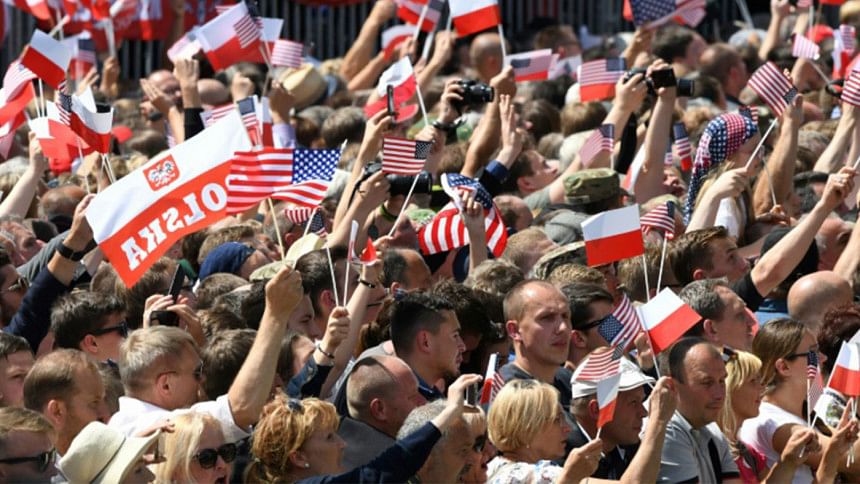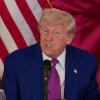Trump backs NATO as he warns future of the West at stake

US President Donald Trump pledged his backing for NATO at the start of a high-stakes visit to Europe on Thursday as he warned that the future of the West was at risk.
In key US ally Poland on the first leg of the trip, he also accused Russia of "destabilising" action and warned North Korea it faced "consequences" after an intercontinental ballistic missile test that has alarmed the international community.
On the eve of what is likely to be a prickly G20 summit, with Trump facing animosity from traditional US allies, he used his keynote address in Warsaw to warn that a lack of collective resolve could doom an alliance that endured through the Cold War.
"The defence of the West ultimately rests not only on means but also on the will of its people to prevail," he said.
"The fundamental question of our time is whether the West has the will to survive."
Seeking to ease allies' concerns about the US commitment to NATO, Trump endorsed its one-for-all-and-all-for-one mutual defence pact.
"The United States has demonstrated not merely with words, but with it actions, that we stand firmly behind Article Five," he said, while calling for more defence spending on the eastern side of the Atlantic.
"The transatlantic bond between the United States and Europe is as strong as ever, and maybe in many ways, even stronger," he added.
Speaking in a country alarmed by Moscow's increasing military assertiveness, Trump -- just a day before he meets President Vladimir Putin at the G20 -- offered rare criticism of Russia's "destabilising" behaviour.
He also said Moscow "may have" tried to influence the 2016 election that brought him to power, but suggested others too may have been involved and blames his predecessor Barack Obama for failing to act.
'Very bad behaviour'
Looming large over his entire European trip is Pyongyang's test of an ICBM that could deliver a nuclear payload to Alaska.
In his first public remarks since the test, Trump said Pyongyang's military sabre-rattling must bring "consequences" and warned he was considering a "severe" response to its 'very, very bad behaviour".
After repeatedly urging Beijing to ratchet up the economic pressure on North Korea, Trump will hold what promises to be a testy meeting with Chinese President Xi Jinping at the G20 in the German city of Hamburg.
The White House wanted to use Trump's Warsaw speech -- with its echoes of historic addresses overseas by Ronald Reagan and John F. Kennedy -- to burnish his credentials as a global statesman and deflect suggestions he is making the United States a virtual pariah.
Speaking at Krasinski Square -- which memorialises the Warsaw uprising against Nazi occupation -- Trump pointed to Poland as an example of resolve in the defence of Western traditions.
"The people of Poland, the people of America, and the people of Europe still cry out 'We want God'," Trump said.
"Our citizens did not win freedom together. Did not survive horrors together. Did not face down evil together only to lose our freedom to a lack of pride and confidence in our values."
Referring to the Nazi and Soviet invasions of Poland, he said: "That's tough."
Around 10,000 people turned out to see him, many arriving on free buses laid on by Poland's conservative ruling party, which was eager to ensure Trump got the adulation he craves.
'Blow to global consensus'
But he is likely to encounter a cool reception elsewhere.
Thomas Wright frm the Brookings Instition said that Trump's backing of NATO's Article Five and reference to the Russian threat had done the "bare minimum" to repair a speech he made to the alliance earlier this year.
"But its overall thrust was one of nationalism and sovereignty," he said.
"The great risk is that in his off-the-cuff remarks he will begin dividing Europe into old and new-- or those who don't like him and his message and those who do."
While Trump positions himself as a leader with the vision to confront an epoch-making crisis, for many US allies in Europe and beyond it is Trump himself who has called the world order -- and a century of American global leadership -- into doubt.
"Trump's decisions to pull out of the Trans-Pacific Partnership and the Paris climate accord have dealt a blow to the near-global consensus," said Dmitri Trenin, director for the Carnegie Moscow Center.
In public, European officials profess the decades-old transatlantic partnership to be inviolable but in private, they wonder whether it can survive four or eight years with an impulsive and capricious US president at the helm.
Trump's four-day swing continues to the Hamburg where tricky geopolitical currents -- from rumbling transatlantic discord over defence and climate change to increasingly difficult ties with China -- will converge.
Friday's meeting between Trump and Putin will -- among other things -- be pored over for its significance to US domestic politics.
Asked about possible Russian meddling in last November's election, Trump said: "I think it could very well have been Russia. I think it could well have been other countries."
Several of Trump's closest aides are under investigation for possible ties with Moscow and the scandal continues to eat away at his administration.

 For all latest news, follow The Daily Star's Google News channel.
For all latest news, follow The Daily Star's Google News channel. 








Comments